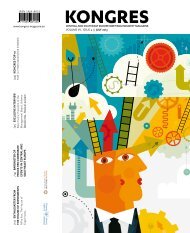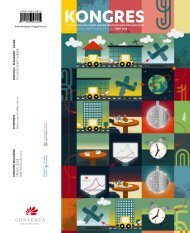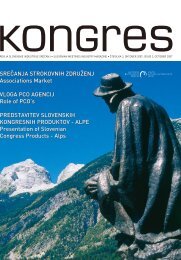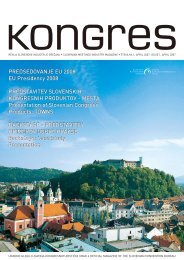EIBTM 2008 Industry Trends & Market Share Report - HCB
EIBTM 2008 Industry Trends & Market Share Report - HCB
EIBTM 2008 Industry Trends & Market Share Report - HCB
Create successful ePaper yourself
Turn your PDF publications into a flip-book with our unique Google optimized e-Paper software.
MEASUREMENT OF ECONOMIC IMPACTS<br />
Something that cannot be measured is rarely valued. For that reason, demonstrating<br />
economic impact has become one of the gold standards for establishing that any<br />
profession or industry is sufficiently mature and established to be taken seriously.<br />
Gradually, the meetings and events industry is moving towards adopting and<br />
implementing the recommended measurement methodological framework,<br />
developed for this specific purpose. A <strong>2008</strong> study, conducted by Maritz Research<br />
Canada and the Conference Board of Canada, was the first to measure the economic<br />
activity surrounding meetings in that country, using the economic measurement<br />
methodology developed by the World Tourism Organization (UNWTO) (with<br />
participation from Meeting Professionals International, Reed Travel Exhibitions, and<br />
the International Congress and Convention Association) designed to calculate levels<br />
of business activity in the meetings sector.<br />
The landmark study commissioned by Meeting Professionals International Foundation<br />
Canada showed that Canada’s meetings sector organized 671,000 meetings in 2006,<br />
welcomed 70.2 million participants, created the equivalent of 235,500 full-year jobs,<br />
and accounted for $32.2 billion in direct spending ($23.3 billion by meeting<br />
participants and $8.9 billion by non-participant sponsors and stakeholders).<br />
However, the significance of this study goes well beyond the impressive figures it has<br />
generated. The decision to build a customised economic accounting model of<br />
meetings activity in Canada based on the UNWTO’s Tourism Satellite Account (TSA)<br />
framework could have far-reaching consequences for meeting professionals and for<br />
the world economy as a whole. A reliable accounting of meetings activity will lead to<br />
greater recognition of meetings as an economic driver, just as the introduction of the<br />
TSA did for tourism. The end result of this research will be for governments at all<br />
levels to recognize that meetings matter, and to ensure that their policies maximize<br />
the industry’s impact as a catalyst for knowledge, action, and economic activity.<br />
The combined weight of the Canadian study and other ongoing pilot projects around<br />
the world will help draw policy-makers’ attention to the importance of measuring and<br />
understanding the economic impact of meetings activity. This momentum will in turn<br />
bring us closer to the day when meetings are recognized around the world as the<br />
important economic driver that they are. It is to be hoped that, over time, adoption<br />
of this methodological approach by governments and international agencies will help<br />
establish recognition for the meetings sector that contributes jobs, tax revenues, and<br />
educational impact to economies around the world. This sector will continue to grow<br />
much faster than ‘older’ industries, so the prize for this recognition is great indeed.<br />
27








